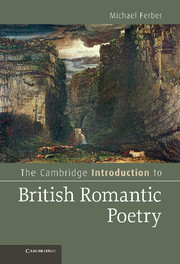Book contents
- Frontmatter
- Contents
- Preface
- Acknowledgments
- Chapter 1 Introduction
- Chapter 2 The poet
- Chapter 3 “Tintern Abbey”
- Chapter 4 Romantic odes
- Chapter 5 The French Revolution
- Chapter 6 Romantic sonnets
- Chapter 7 Romantic love lyrics
- Chapter 8 Romantic ballads
- Chapter 9 Romantic epics and romances
- Chapter 10 Romantic verse drama
- Chapter 11 Romantic satire
- Appendix
- Notes
- Further reading
- Index
Chapter 8 - Romantic ballads
Published online by Cambridge University Press: 05 June 2012
- Frontmatter
- Contents
- Preface
- Acknowledgments
- Chapter 1 Introduction
- Chapter 2 The poet
- Chapter 3 “Tintern Abbey”
- Chapter 4 Romantic odes
- Chapter 5 The French Revolution
- Chapter 6 Romantic sonnets
- Chapter 7 Romantic love lyrics
- Chapter 8 Romantic ballads
- Chapter 9 Romantic epics and romances
- Chapter 10 Romantic verse drama
- Chapter 11 Romantic satire
- Appendix
- Notes
- Further reading
- Index
Summary
The volume of poems that contains “Tintern Abbey” is entitled Lyrical Ballads, with A Few Other Poems, and at least twelve of its twenty-three poems, including the longest by far, are ballads. To the second edition (1800) so many more “other” poems are added (and only a handful of new ballads) that A Few is dropped from the subtitle, but the title remains the same: the ballads get top billing. Though “Tintern Abbey,” the “Lucy” poems, “Michael,” and “The Old Cumberland Beggar” are all to be found in it, poems we think of as far greater than all but one of the ballads (the one by Coleridge), Wordsworth evidently still expected his readers to find ballads most attractive, perhaps out of curiosity as to what “lyrical” ballads might be. Ballads were in vogue, and Wordsworth and Coleridge were riding the wave.
Found throughout Europe and beyond, folk ballads, or traditional ballads, are very old, probably many millennia old. They are fairly short oral narrative poems sung by illiterate men or women, often with a repeated refrain sung by a group, the “chorus.” In many places they seem to have been danced to, at least during the refrains, as the very word suggests: it comes from Old French ballade, from Provençal balada, which meant “song accompanied by dance,” from balar, “dance,” from Latin ballare, from Greek ballizein. Our words “ball” and “ballet” are from the same Latin source. They tell a story, often about love or war, and usually enter it near the climax or most dramatic moment. There is little background or context setting, characters are generic types and thinly sketched, the narrator’s voice is impersonal, and the diction is simple and unembellished. Most oral ballads were divided into stanzas or strophes, with rhyme or other sound effects; in English the typical “ballad stanza” had alternating four-beat and three-beat lines, four lines to a stanza, and rhymed abab or abcb.
- Type
- Chapter
- Information
- The Cambridge Introduction to British Romantic Poetry , pp. 146 - 160Publisher: Cambridge University PressPrint publication year: 2012

